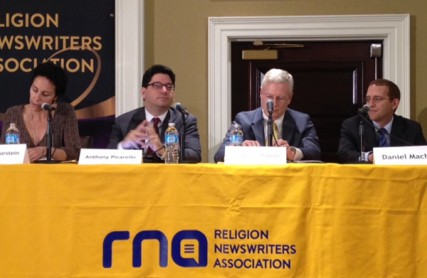
BETHESDA, MD — How does the state of religious freedom in the United States today compare to 20 years ago? That was the question kicking off the panel discussion about current first amendment issues affecting the political square at the 63rd Religion Newswriters Association Conference on Friday (Oct. 5).
Guest panelists were Daniel Mach, director of the Americans for Civil Liberties Union’s program on Freedom of Religion and Belief, Charles A. Haynes, senior scholar of the First Amendment Center and director of The Religious Freedom Education Project at the Newseum in Washington D.C. and Anthony Picarello, associate general secretary and general counsel for the U.S. Conference of Catholic Bishops.
The issues: our history
“A 100 years ago, we were a semi-established Protestant nation. But in 20th century, we went through a time when we thought about living up to the free exercise clause and the First Amendment in new ways,” Haynes said. “It’s a matter of perspective whether we are better or worse off on First Amendment issues. But we are still the boldest and most successful experiment in freedom of religion and conscience the world has ever seen.”
Mach said the right to free exercise of religion is seeing the most strain in America right now.
“One of our greatest religious liberty challenges today is the rights of Muslims in this country,” he added.
But guaranteeing every believer or unbeliever protections is still a tough target, the panelists agreed.
“If you defang the First Amendment and free exercise as a litigation tool, then you’re leaving it to all those contingencies that bring people down below that uniformity,” of protection, Picarello said.
Christian nation?
There are a lot of Americans who still think of America as a distinctly Christian nation and believe it has fallen away from its roots, Haynes said.
“The story of American history is the struggle with different visions of what this society should be. It’s the idea of the Biblical commonwealth,” he said, “acknowledging that our liberties come from God is still very real among people. And in moments of crisis, we return to that vision and some believe the reason we’re suffering and falling apart is because we’ve fallen away from that ideal.”
Faith and public schools
Picarello highlighted trends in education and faith worth following heading into 2013 – an uptick in interest in parental educational choice and the downtown of Catholic schools in urban settings.
“It’s no longer just about vouchers and tax credits but different kinds of religious schools and charter schools are getting involved in parental choice,” he added. “And as more Catholics move to the suburbs, the infrastructure [of urban Catholic schools] is being diluted of Catholics.”
Mach spoke of a project the ACLU is trying in South Carolina Public Schools to guard against evangelism in the classroom.
“ACLU started the Religious Freedom Goes to School campaign, sending letters to all of South Carolina’s schools,” Mach said. “We focused our efforts on South Carolina because of abuses in the Chesterfield County school system where they were inviting local ministers to convert kids to Christ. And the students who didn’t go to the assemblies were sent to in school suspension. It wasn’t a hard case to prove because the Christian rapper [at one of these services] recorded it all and put it up on YouTube.”
During the video (above), the Christian rapper boasts his ministry brought 324 middle school children to Christ during assemblies that day.
Gay marriage
Though Haynes said he thought the government should “get out of the marriage business,” he said he knew that couldn’t happen.
“Clergy are state officials when it comes to marriage,” he said. “I don’t want to be prophetic, but I think same sex marriage nationwide is inevitable.”
No matter how you feel about gay marriage, Haynes said, it’s important for both sides to come together to protect religious freedom implications in that debate.
When asked if banning all religious speech from the public square might be an answer to the current cultural divide on gay marriage and other issues, Picarello shook his head.
“I hope the response to religion in the public square is to let 1,000 flowers bloom,” he said, “and not to spray Round-up on all of them.”










The bottom line is Congress is not to make any law that puts ONE religiious belief or right above another. Muslims have a right to practice their belief and Congress nor the government has any business telling them what to believe or who can come to their mosque. The same applies to Jewish, Buddists, Christians etc. Just because Gay rights have been established by Government it does not establish that all clergy from any and all denominations, orginizations and churches or temples have to go against their belief to unite a Gay couple in marriage. To do so is to establish one belief above another. But already our nation has broken the first amendment religious rights with Sunday Blue laws making Sunday the official day of Worship and day off and taking off shutting down all government offices, banks etc for Christmas when many do not observe this day and should be allowed to do business and or work if they wish. It is forced on them to take this time off. But when they ask for time of for their own religious observance they get flack from employers and the government turns a blind eye and in fact government is guilty of not allowing workers of different belief time off without penalty as well. We are getting to where there is no respect and government is too much in the church business.